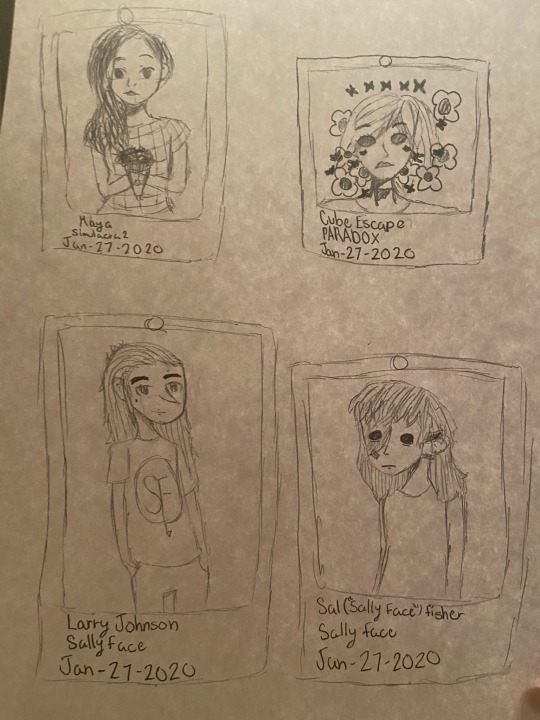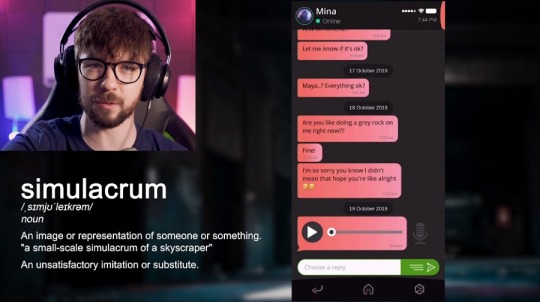#simulacra maya
Text
Simulacra(1, 2, PD) Incorrect Quotes Part 2
These mainly take as if it was somewhat the Content AU(their nicknames, genders, and other) and mixed slightly with canon, depending on the quote.
I may do art of them at some point, feel free to do art of them yourself though, if you want, just tag me since I'd want to see it.
For context:
-The first Simulacra(from Simulacra 1) is nicknamed Phoney.
-The second Simulacra(from Simulacra 2) is nicknamed Ripple Man, obv.
-The Pipe Dreams Simulacra is nicknamed Flappee.
-The MC from the first game is labeled MC 1, MC from the second game being labeled as MC 2.
-The MC from Pipe Dreams is labeled MC PD.
Flappee: I woke up and chose VIOLENCE. I WILL COMMIT ARSON AND BURN EVERYTHING TO THE GROUND!!! I AM ANGRY-
Teddy: Awwww, you’re so adorable! Give me a hug~
Flappee: Wh-What? nO, yOURE SUPPOSED TO BE SCARED OF ME! TREMBLE BEFORE MY WRATH-
MC PD, recording: This is so cute.
Flappee: I dare you to kiss the next person who walks into this room.
Teddy: Screw that, I’m not kissing any of you.
MC PD walks in
Teddy: Fine, I’ll do it. Rules are rules you know.
the Squad cleaning up
MC PD: Pick up the nearest piece of trash and throw it away.
Flappee, to Teddy: Aight, which bin do you wanna go in—
Arya: Imagine if someone handed you a box full of all the things you lost throughout your life.
Rippleman: It would be nice to have my sense of purpose back…
Rex: Oh wow, my childhood innocence! Thank you for finding this.
Mina: My will to live! I haven't seen this in years.
MC 2: I knew I lost that potential somewhere.
Maya: Mental stability, my old friend!
Arya: Jesus, could you guys lighten up a little?
Mina: Who the fuck added me to a fucking group chat?
Maya: >:O language
Rippleman: Yeah watch your fucking language
Rex: Okay, who taught Rippleman the fuck word?!
Arya: 'The fuck word'.
MC 2: Are you stupid? You guys use the f word all the time
Rippleman: Oh my god they censored it
Arya: Say fuck, MC 2.
Rippleman: Do it, MC 2. Say fuck.
Arya: Who else is hiding in the laundry room trying to listen to MC 2 and Maya's convo?
Mina: Me. I'm in the laundry basket.
Rippleman: I'm in the washing machine.
Rex: I'm in the closet.
Mina: We accept you Rex. <3
Rex: No I'm literally in the closet.
Mina: Love is love. <3
Arya: She was poetry, but he couldn't read.
MC 2: His name was Jared he's 19.
Mina: When his parents built a very strange machine.
Rippleman, singing: Watch that scene, digging the dancing queen.
Maya, singing: Eyyyy, Macarena!
Rex: Horrible job everyone.
Murilo, to Rippleman: Why is MC 2 not talking?
Rippleman: I'm playing the silent game with them.
Murilo: Well, then you just lost.
Rippleman: I lost two hours ago. I gave them ear plugs and told them to close their eyes. It was the only way I could think of to get them to shut up.
MC 2: Why's it called an oven when you of in the cold food and you of out hot eat the food?
Murilo: …What???
MC 2: I don’t think we can mansplain, manipulate, or malewife our way out of it this time.
Murilo: cracks knuckles Manslaughter it is!
MC PD: I think MC 2 is in trouble.
MC 1: Alright. Struggling to give a fuck, if I’m honest.
Rippleman: Hey bro, what do you want to eat?
Phoney: The souls of the innocent!
Flappee: A bagel.
Phoney: No!
Flappee: Two bagels.
Flappee: It’s impossible to make a sentence without using the letter A.
Phoney: Despite your thinking, it is quite possible, yet difficult, to form one without the specific letter. Here’s one more to further disprove your theory.
Rippleman: Fuck you.
Rippleman: Now, Flappee, all of us are doing this because we care about you, okay?
Phoney: Except for me. I just wanted to see the look on your face.
Rippleman: Where is everyone?
Flappee: Phoney had a nervous collapse, MC 2 is looking after them, MC 1 is trying to kill MC PD, so I’m in charge.
Rippleman: Oh my god!
Flappee: I know, right?
MC 1: Man, they look like a real handful. How do you deal with them?
Phoney, watching Flappee screaming, Rippleman trying to set a sleeping MC PD on fire, and MC 2 choking on air: I don't know either.
Taylor: When Phoney was born, the gods said, "They're too perfect for this world."
Anna: Please. When they were born, the devil said, "Oh, competition."
Anna: Hey, check out my Spongebob umbrella!
Anna opens their umbrella while indoors
Taylor: Anna, that’s bad luck…
Anna: Chill out, Taylor!
Phoney, kicking down the door: WHO SUMMONED ME?!?!
Anna and Taylor: screams
Anna: How do you do that?
Taylor: I'm fearless.
Phoney: I saw you run from bees yesterday. You flailed around and tripped over a chair. It was both hysterical and sad.
Taylor: I'm mostly fearless.
Mina: What do rainbows mean to you?
Arya: Gay rights.
Rippleman: There's money.
Murilo: The sign of God's promise to never destroy the whole Earth with a flood.
Rex: It is an optical phenomenon that separates sunlight into its continuous spectrum when the sun shines on raindrops.
Murilo: Anyone d-
Arya: Depressed?
Rex: Drained?
Mina: Dumb?
Rippleman: Disliked?
Murilo: -done with their work… what is wrong with you people…
#simulacra#simulacra 2#simulacra pipe dreams#simulacra headcanons#simulacrum#simulacra au#simulacra arya#simulacra mc#simulacra game#simulacra rex#simulacra murilo#simulacra taylor#simulacra anna#simulacra mina#simulacra maya#simulacra teddy#for fun#because why not#incorrect quotes#shitpost
17 notes
·
View notes
Text
I want to share a small hypothesis about the world of Simulacra. I have to clarify that I haven't played the third game yet, and got only a couple of endings in the second one, because I can't stand this part. Perhaps somewhere there are direct explicit denials of the following, then take it just as another AU of mine.
So the thought is: what if the characters in these games are living in a simulation?
Let me explain my train of thought. None of the games give us more information about simulacrums than the fact that they are some powerful creatures that love to play around with human destinies. And their most important distinguishing feature is that they are all tightly tied to different kind of technologies. Then the question arises: did they exist before technology? Given HOW MUCH exactly this feature plays a role in the plots of games, I doubt it. However, it means that they were also created by people, which contradicts the fact that only a few units of the population know about them, and then only the very grains. Even the verified methods of destroying creatures do not exist, except for one of the positive ending of the second part, invented in the process.
The only significant thing that the creators gave us on this topic is an article from the second game. It says that the influencer awakened the beast simply by becoming popular. It didn't look like he had summoned a demon with a ritual, it was more like some being was just showing an interest in him. In addition, Charlie himself spoke of this creature as a Deity. And this, after all, correlates with past information - they have repeatedly proved in words and in deeds that in terms of abilities they are MUCH superior to people.
What I try to say is that one of the variations of the theory about our world as a matrix implies that there is a certain superior race that controls this matrix and we are a human zoo for it or something like that. In my version, simulacrum creatures actually are some kind of higher organisms and the world of characters for them is like a fancy board game with a ton of figurines laid out in front of their metaphorical noses. They lived quietly for themselves, and then something took place that irritated them and they began to abuse their little animals in various twisted ways.
Therefore, they do not have a full-fledged physical appearance and communicate only via messages in instant messengers or through human carriers. They are with people on different levels of reality, like pen pals from different cities, with the only difference being that one can kill another using only its will. Therefore, Taylor's consciousness was captured in seconds despite the distance. Therefore, in the bad ending, Teddy can be DELETED from the world. Therefore, Maya saw technical interference in reality, around her.
And you, as a player, are immersed in the shoes of just such a non-playable character, a faceless member of the crowd, who must find a way to agree with someone, who is actually playing here.
#SIMULACRA#THE SIMULACRA#SIMULACRA GAME#Simulacra Pipe Dreams#Simulacra: Pipe dreams#Simulacra 2#some characters are mentioned but I won’t tag them#textual idea
15 notes
·
View notes
Text
freaking out rn because i just discovered THE MOST PERFECT SIMULACRA 2 SONG
I've been listening to BABYMETAL as of late and one of their songs is titled "MAYA"
AND ONE OF THE LYRICS IS
"How would you know the difference
Between the virtual world
And the real world?
Maybe what you see with your eyes
Is all an illusion"
IT'S SO PERFECT OMGGGG if i ever make a simulacra playlist, this song is definitely going in there
#simulacra#simulacra 2#simulacra game#THIS HYPERFIXATION IS TAKING OVER MY LIFE#also hello to the only other 2 people in this fandom <3
11 notes
·
View notes
Text
big simulacra spoilers under the cut
Ok, so we know Simulacra is very much about people not being what they seem and critiquing the internet...
...But could we talk about how it's also about everyone deserving a second chance no matter what? Cuz I don't ever see people talking about that.
In the first simulacra game, Taylor is a registered sex offender. And while only you can choose to believe whether it is true or not, the game makes you see that Taylor deserves a second chance at living as much as Anna does.
In Simulacra Pipe Dreams, you can see how your friend [I FORGOT HIS NAME I'M SORRY] has his struggles with addiction, and throughout the entire game you are made to try and save someone who before you never even knew.
And oh boy, Simulacra 2. Let's get a rundown on that!
There is the detective, who has stolen shit just to give the case a second chance [You see what I did there?] at a real resolution, who is then given a second chance by the department in the middle of the game after they find out, and you want to make sure this man's second chance goes well because you know him.
There's Rex, who literally has a pyramid scheme and knew what he was doing was completely wrong.
There's Mina, who lied about seeing ""her best friend"" die in a car crash. And there is also the whole "selling trauma" thing.
There is Arya too, who faked being an ambassador for Aluren. I'm 99% sure there's more than that but unfortunately my memory is trash and I'm going off the wiki which is quite bare bones.
But, in the end, the three above friends of Maya aren't just heartless people. You see how much they cared for Maya, whether it's them saying it themselves or through the actions you can see. In fact, them all blaming each other for her death probably is mostly because they actually cared.
In the end, literally the best ending is to save them all. You are still made to want to save them, no matter how awful the people may be.
Also, TRM and the ripple man literally both are proposing second chances to people. A second chance at popularity, a second chance at a better reality, do you see where I am coming from with the claim that this entire series is about second chances?
I may be wrong, and Simulacra 3 will come unto my world and shatter that idea. But from where I see, the biggest things about this story is the worst of humanity, but also the best of it still being in there, and the only steps one can take being the next.
#Simulacra#Simulacra 2#Simulacra Pipe Dreams#Simulacra: Pipe Dreams#did i write this in part because markiplier seems to keep taking over the tag... mayhaps.#Simulacra 3#<- just incase#simulacra#simulacra 2#simulacra pipe dreams#simulacra: pipe dreams#simulacra 3#BACK IN MY DAY CAPS DIDNT MATTER IN THE TAGS
35 notes
·
View notes
Text

made some art
19 notes
·
View notes
Photo










Screenshots from These People Are Not What They Seem In Simulacra 2 Part 2! :D
Honestly I love the inlfuencer online vs real life stuff that the this game talks about. It’s makes it more interesting finding out who Maya is and how her “friends” or business partners treated her and how some people online see her too. Even though the acting in this game isn’t the best. xD But I think my favorite part of these videos so far is Seán’s commentary because of the talk of influencers in this game. He gives very solid life advice and he talks about how he relates to what the game talks about with his own online life. Plus you can see that the way some of the characters act drive him nuts because how not genuine they’re being and how they only care about the numbers side to everything and not what they’re creating or bringing out to the world. It seems like it struck this personal cord with him and I think that’s making the commentary really interesting to listen to in these videos. :)
Honestly though, I think Seán’s one of the most genuine people I’ve seen online. I’ve been following him since 2015 and a lot his morals and values that he had when I first discovered him is still the same and there even to this day. His appreciation for the people who watch and being humble about everything that he’s gained in his life in all the years he’s been doing Youtube. Even when I met him there was the vibe and energy I felt from him that you could tell that every person who went up to meet him mattered to him and that this was his favorite part of being a Youtuber besides creating content in general. I still feel and see that vibe and energy radiating off of him even to this day and it’s one of the biggest things that’s stuck with me in all these years. From what I know of him and about him from hearing other people talk about him is that he’s not that much different online then who he is in real life. I mean obviously I don’t know him personally at all. I’ve only ever had 1 real conversation with him and that was from when I met him at Pax East 2016. Plus why the hell would ever want to really know and be friends with me? xD So take what I just said with a grain of salt but still from what I’ve heard, he’s not that much different. I think that he’s set a lot more boundaries for himself in these more recent years but that’s not a bad thing because he was giving himself away too much to people and it was effecting his mental health because he just wouldn’t put himself first ever and was terrified of disappointing people. But now he does put himself first and that makes me happy. Self care, taking the time to take care of yourself and finding value in yourself is extremely important! I mean I don’t always like everything he does or everything he says or every joke he makes and sometimes I question some the decisions he makes too. But for most part in my opinion a lot of the important stuff, values and morals has stayed pretty consistent with him in all these years. Which is one of the biggest reasons why I really respect Seán. As a Youtuber and as a person too. :)
71 notes
·
View notes
Photo








These People Are Not What They Seem In Simulacra 2 - Part 2
Screenpics from the start of the episode today were Jack dug more into Maya’s life.
#jacksepticeye#Jse#photo spam#it's nice hearing Jack talk about the social medias from his perspective#12-22-2019
50 notes
·
View notes
Text
got around to watching the new Simulacra and honestly ticked me off cause Jack knew the whole time it was Maya but the game kept going “NO it was one of tHESE THREE ANNOYING PEOPLE” and never gave him the chance to say it was Maya or anything and then when it forced him to choose it was like “HOW COULD YOUUUU” and it was so dumb lol. why would it do that. might go rewatch the first one instead haha
26 notes
·
View notes
Text
Soo I was watching @therealjacksepticeye first episode of Simulacra 2 and I noticed something that makes me think of a theory ! So in the first game the main objective was to save Anna and the game has 4 endings but the one where you could save both was kinda hard to get ( the one Jack wanted to get ) so many people that played the game got to decide if they will save Taylor or Anna and because as I said the main objective was to save Anna the majority of people chose to save Anna !If you look at the screen shot the simulacra says:Anna will be released and Taylor will become my new host!


And in Simulacra 2 when Arya was talking to Maya she mentioned something about a Taylor on Spark(wich was the app that conected the simulacra to its next victim)and that he told Maya to go to a rooftop where in the first game the body that was controled by the simulacra was distroyed after it took control of the new body !So I was thinking that the simulacra from the first game tried to make Maya his new victim trough Spark but failed and then tried into a new form wich is the TRM that convinced Maya because TRM helped her get rid of all the hate and it helped make her numbers go up but it was all a trap to actually get Maya !🤔 But Maya died wich means the simulacra might already found a new host so who is the new host ? It's the one who accepted the deal? And if yes who is the new victim? Is the detective or the other two "friends" ? I think it is one of her friends the new host because they were there when she died !It could be Mina because after you show them the video she already starts to say that she is inocent and tries to blame the others ! But right now we have to see how this game ends ! This is my theory and maybe it is true ! I don't know but in this way it is more conected to the first game !
13 notes
·
View notes
Text
Simulacra 2: My Critique
I think the biggest problem with the sequel was we didn’t get attached to a character so it made it easy to not care as much.
In the first one, they built Anna’s character up really well and I actually cared about what happened to her. Plus, that was the mystery and that’s what drew you in as a player — the creepy sounds and jump scares just spiced it up. Plus Greg was funny as hell and Ashley was cute. Even Taylor was entertaining, though weird.
What might’ve been helpful in this one was a person in the group who was clearly on the “other” side of influencer culture. Maybe Arya could’ve been the one who was like “Come on guys, there’s more to life than followers” or “Be true to yourself” kinda thing
That was an interesting touch — ya know, what one would do for followers. How influencers acted when they considered followers such a big deal. How they portrayed themselves online versus how they were behind the scenes. But Arya, Mina and Rex were all equally douchey. Plus what we saw of Maya’s character even seemed whatever. There was no one to root for.
Add to that the lack of mystery behind the whole thing (we knew a Simulacra of some kind was responsible and we already knew Maya was dead) and...yeah. It just didn’t get me.
I might play Simulacra 2 myself and see if I can get a different ending...maybe it was just that part. I have to agree with Seán though, I didn’t get into this sequel as much and the first one was WAY better.
13 notes
·
View notes
Text
So Maya from Simulacra 2 was really into yoga, eh?
Good thing Jack has no characters that he's mentioned taking up yoga as a hobby a couple years ago that people could consequently draw connections to.
/s
;)
11 notes
·
View notes
Text
Simulacra(1, 2, PD) Incorrect Quotes: Shipping Break
These mainly take as if it was somewhat the Content AU(their nicknames, genders, and other) and mixed slightly with canon, depending on the quote.
I may do art of them at some point, feel free to do art of them yourself though, if you want, just tag me since I'd want to see it.
For context:
-The first Simulacra(from Simulacra 1) is nicknamed Phoney.
-The second Simulacra(from Simulacra 2) is nicknamed Ripple Man, obv.
-The Pipe Dreams Simulacra is nicknamed Flappee.
-The MC from the first game is labeled MC 1, MC from the second game being labeled as MC 2.
-The MC from Pipe Dreams is labeled MC PD.
Rippleman: If I fall…
MC PD: I’ll be there to catch you.
MC 1: *looks at MC 2* What if I fall?
MC 2: Then I’ll fall with you, never leaving your side.
Flappee: *watches these two interactions*
Flappee, to Phoney: And if I fall?
Phoney: I’ll be the one who pushed you.
Phoney: I put the pun in punishment.
MC 2: I put the top in unstoppable.
Rippleman: I put the cute in execute.
MC 1: I put the sexy in dyslexia.
MC PD: I put the ass in class.
Flappee: I put the D in Phoney.
Taylor: I sleep with a gun under my pillow.
Greg: I sleep with a knife.
Anna: Both of you are pathetic.
Taylor: Oh yeah? What do you sleep with?
Anna: Ashley.
Ashley: *about Taylor and Greg* They make a cute couple, huh?
Anna: They certainly are standing next to each other.
Anna: I love you.
Ashley: I love you too. I've waited so long to hear you say that.
*Anna and Ashley kiss passionately*
Taylor, to Greg: You owe me 20 dollars.
Maya: This food is too hot... I cant eat it.
Arya: You’re very hot, and I still eat you.
Everyone at the table: *silence*
Mina: YOU GUYS ARE DISGUSTING!
Rex: One dinner... I just want ONE DINNER!
Arya: I spy with my little eye something that begins with the letter “s”.
Mina: *looks over at Rex and Maya*
Mina: Is it “sexual tension”?
Rex: *sees Mina and Arya together*
Rex: They're cute. I would put them on a boat.
Maya: You mean... you ship them?
*Trying to cheer Arya after a break up*
Maya: You broke up with Rex for a reason.
Arya: I know, I know. I’m just so tired of missing them. Tired of wondering why they haven’t called. Why haven’t they called?
Mina: Maybe because you told them not to.
Arya: What are you, the Memory Person?
Rex: Arya! I can't do this stupid math!
Arya: What’s the math problem?
Rex: Well, we have to add the bed, subtract the clothes divide the legs, and hope we don’t multiply.
Maya, covering Mina's ears, while Arya smacks Rex upside the head: Not going to lie that was hella smooth.
Rex: Hey Arya, wanna third wheel on my date with Maya tomorrow?
Arya: Sure.
Rex: Mina! Wanna third wheel on my date with Maya tomorrow?
Rex: Great! I've always wanted to go on a double date!
Arya & Mina: ...
Maya: Rex...
MC PD: Wow, they really hate us.
Teddy: Yes, perhaps they’re homophobic.
MC PD: But we’re not gay, Teddy.
Teddy:
MC PD:
Teddy: We’re not?
#simulacra#simulacra 2#simulacra pipe dreams#simulacrum#simulacra headcanons#simulacra mc#simulacra au#simulacra arya#simulacra anna#simulacra ashley#simulacra maya#simulacra mina#simulacra rex#simulacra teddy#simulacra taylor#incorrect quotes#slight ship#shipping#shitpost#for fun#because why not#what is this#i'm on a roll
7 notes
·
View notes
Text
Love, Pain, and Growth: The Forgotten Philosopher, Poet, and Pioneering LGBT Rights Activist Edward Carpenter on How to Survive the Agony of Falling in Love
“Self-consciousness is fatal to love. The self-conscious lover never ‘arrives.’”
“Loving anybody and being loved by anybody is a tremendous danger, a tremendous responsibility,” James Baldwin reflected in his final interview. “An honorable human relationship — that is, one in which two people have the right to use the word ‘love’ — is a process, delicate, violent, often terrifying to both persons involved, a process of refining the truths they can tell each other,” Adrienne Rich wrote in her superb meditation on the dignity of love. Both the danger and the responsibility of love lie in this refining of truth, which is at bottom a refining of self, for we are the sum total of the truths by which we live. In love — in the beauty and brutality of it — we can come completely undone. But we can also make and remake ourselves. From our formative attachments to our great loves, relationship is the seedbed of our becoming, the laboratory of our self-invention and reinvention.
Nearly a century before Rich and Baldwin, the English philosopher, poet, and early LGBT rights activist Edward Carpenter (August 29, 1844–June 28, 1929) examined this eternal question of how we grow and refine ourselves through the turbulent process of love in his uncommonly insightful 1912 book The Drama of Love and Death: A Study of Human Evolution and Transfiguration (public library).
A correspondent of Gandhi’s and a close friend of the Indian poet and philosopher Rabindranath Tagore — the first non-European to win the Nobel Prize, who also believed that “relationship is the fundamental truth of this world of appearance” — Carpenter was one of the first Western thinkers to incorporate ancient Eastern philosophy into his moral universe. Entwined in mutual admiration with Walt Whitman, he went on to influence writers like D.H. Lawrence and E.M. Forster.
Carpenter composed his treatise on love two decades after he met his own great love, George Merrill, at the ripe age of fifty. They would spend the remainder of life together. Several months after Merrill’s death, Carpenter suffered a paralytic stroke. He died a year later and was buried next to his beloved.
Our first experience of great love, Carpenter observes, always shocks and unsteadies us, for universal as the experience may be, it “cannot very well be described in advance, or put into terms of reasonable and well-conducted words.” (In that sense, perhaps, love shares a great deal with loss — we can never prepare for either, and each snatches the reins of our psyche to govern us on its own non-negotiable terms.) He paints the delicious and disorienting madness familiar to anyone who has ever fallen in love:
“To feel — for instance — one’s whole internal economy in process of being melted out and removed to a distance, as it were into the keeping of some one else, is in itself a strange physiological or psychological experience… To lose consciousness never for a moment of the painful void so created — a void and a hunger which permeates all the arteries and organs, and every cranny of the body and the mind, and which seems to rob the organism of its strength, sometimes even to threaten it with ruin; to forego all interest in life, except in one thing — and that thing a person; to be aware, on the other hand, with strange elation and joy, that this new person or presence is infusing itself into one’s most intimate being — pervading all the channels, with promise [of] new life to every minutest cell, and causing 25 wonderful upheavals and transformations in tissue and fluids; to find in the mind all objects of perception to be changed and different from what they were before; and to be dimly conscious that the reason why they are so is because the background and constitution of the perceiving mind is itself changed — that, as it were, there is another person beholding them as well as oneself– all this defies description in words, or any possibility of exact statement beforehand; and yet the actual fact when it arrives is overwhelming in solid force and reality. If, besides, to the insurgence of these strange emotions we add — in the earliest stages of love at least — their bewildering fluctuation, from the deeps of vain longing and desire to the confident and ecstatic heights of expectation or fulfilment — the very joys of heaven and pangs of hell in swift and tantalizing alternation — the whole new experience is so extraordinary, so unrelated to ordinary work-a-day life, that to recite it is often only to raise a smile of dismissal of the subject — as it were into the land of dreams.
And yet, as we have indicated, the thing, whatever it is, is certainly by no means insubstantial and unreal. Nothing seems indeed more certain than that in this strange revolution in the relations of two people to each other — called “falling in love” — and behind all the illusions connected with it, something is happening, something very real, very important.”
Carpenter then makes an astute point that remains thoroughly countercultural in the context of our rather limited and limiting romantic mythologies: He argues that whatever the outcome of a great love, whatever its duration, it is still a triumph and a transformation to be celebrated.
In Figuring, reflecting on Margaret Fuller’s remark at the end of a significant love affair that “the union of two natures for a time is so great,” I wrote:
“Are we to despair or rejoice over the fact that even the greatest loves exist only ‘for a time’? The time scales are elastic, contracting and expanding with the depth and magnitude of each love, but they are always finite — like books, like lives, like the universe itself. The triumph of love is in the courage and integrity with which we inhabit the transcendent transience that binds two people for the time it binds them, before letting go with equal courage and integrity.”
I find such consonant consolation in Carpenter’s words:
“The falling-in-love may be reciprocal, or it may be onesided; it may be successful, or it may be unsuccessful; it may be only a surface indication of other and very different events; but anyhow, deep down in the sub-conscious world, something is happening. It may be that two unseen and only dimly suspected existences are becoming really and permanently united; it may be that for a certain period, or (what perhaps comes to the same thing) that to a certain depth, they are transfusing and profoundly modifying each other; it may be that the mingling of elements and the transformation is taking place almost entirely in one person, and only to a slight degree or hardly at all in the other; yet in all these cases — beneath the illusions, the misapprehensions, the mirage and the maya, the surface satisfactions and the internal disappointments — something very real is happening, an important growth and evolution is taking place.”
Noting that understanding this bewildering phenomenon, having even the slightest sense of “the points of the compass by which to steer over this exceedingly troubled sea,” is an operative imperative for any human being’s personal maturation, Carpenter adds:
“Love is concerned with growth and evolution. It is — though as yet hardly acknowledged in that connection — a root-factor of ordinary human growth; for in so far as it is a hunger of the individual, the satisfaction of that hunger is necessary for individual growth — necessary (in its various forms) for physical, mental and spiritual nourishment, for health, mental energy, large affectional capacity, and so forth. And it is — though this too is not sufficiently acknowledged — a root-factor of the Evolution process. For in so far as it represents and gives rise to the union of two beings in a new form, it plainly represents a step in Evolution, and plainly suggests that the direction of that step will somehow depend upon the character and quality of the love concerned.”
One of our greatest misunderstandings about love, and mispractices of it, is the tendency to focus on only those aspects of the other that rivet us most intensely — only the physical in an attraction dominated by lust, only the mental in an intellectual crush, only the emotional in a romantic infatuation. Cautioning against such fragmentary simulacra of love, Carpenter writes:
“Love is a complex of human relations — physical, mental, emotional, spiritual, and so forth — all more or less necessary. And though seldom realized complete, it is felt, and feels itself, to be imperfect without some representation of every side. To limit it to the expression of one particular aspect would be totally inadequate, if not absurd and impossible. A merely physical love, for instance, on the sexual plane, is an absurdity, a dead letter — the enjoyment and fruition of the physical depending so much on the feeling expressed, that without the latter there is next to no satisfaction. At best there is merely a negative pleasure, a relief, arising from the solution of a previous state of corporeal tension. And in such cases intercourse is easily followed by depression and disappointment. For if there is not enough of the more subtle and durable elements in love, to remain after the physical has been satisfied, and to hold the two parties close together, why, the last state may well be worse than the first!
But equally absurd is any attempt to limit, for instance, to the mental plane, and to make love a matter of affectionate letter-writing merely, or of concordant views on political economy; or again, to confine it to the emotional plane, and the region of more or less sloppy sentiment; or to the spiritual, with a somewhat lofty contempt of the material — in which case it tends… to become too like trying to paint a picture without the use of pigments.”
He notes the necessary complementarity of these elements in a truly satisfying love — a simple and rather obvious point, yet one to which we so readily turn a willfully blind eye when governed by a strong attraction:
“The physical is desirable, for many very obvious reasons — including corporeal needs and health, and perhaps especially because it acts in the way of removal of barriers, and so opens the path to other intimacies. The mental is desirable, to give form and outline to the relation; the emotional, to provide the something to be expressed; and the spiritual to give permanence and absolute solidity to the whole structure.”
More than a century before the great Zen teacher Thich Nhat Hanh asserted that “to love without knowing how to love wounds the person we love,” Carpenter argues that love is not merely an internal state — it is also an outward practice, to be mastered and refined by engaging every aspect of oneself and the beloved:
“Love has its two sides — its instantaneous inner side, and its complex outer side of innumerable detail. In consciousness it tends to appear in a flash — simple, unique, and unchangeable; but in experience it has to be worked out with much labor. All the elements have to come into operation, and to contribute their respective quota to the total result… Love searches the heart, drags every element of the inner nature forward from its lurking-place, gives it definition and shape, and somehow insists on it being represented.”
If this holistic satisfaction of the soul is the one leg on which love stands, time is the other. In a sentiment that calls to mind John Steinbeck’s beautiful letter of advice to his lovestruck teenage son — “If it is right, it happens,” the Nobel laureate wrote. “The main thing is not to hurry. Nothing good gets away.” — Carpenter urges:
“For any big relationship plenty of time has to be allowed. Whichever side of the nature — mental, emotional, physical, and so forth — may have happened to take the lead, it must not and cannot monopolize the affair. It must drag the other sides in and give them their place. And this means time, and temporary bewilderment and confusion.”
A century before the Lebanese-American poet and philosopher Kahlil Gibran contemplated the courage to weather the uncertainties of love, Carpenter adds:
“For the complete action of that creative and organizing force plentiful time must be given; and the two lovers must possess their souls in patience till it has had its full and perfect work… A long foreground of approach, time and tact, diffusion of magnetism, mergence in one another, suffering, and even pain — all these must be expected and allowed for — though the best after all, in this as in other things, is often the unexpected and the unprepared.”
A century earlier, the philosopher William Godwin had written in his stunning love letters to the philosopher and feminism founding mother Mary Wollstonecraft as the two were forging the first true marriage of equals in the history of letters: “We love… to multiply our consciousness… even at the hazard… of opening new avenues for pain and misery to attack us.” Carpenter examines this most bewildering aspect of the experience — the curious interdependence between love and pain, which seems to be an inevitable function of the growth process love effects:
“Love, if worth anything, seems to demand pain and strain in order to prove itself, and is not satisfied with an easy attainment. How indeed should one know the great heights except by the rocks and escarpments? And pain often in some strange way seems to be the measure of love — the measure by which we are assured that love is true and real; and so (which is one of the mysteries) it becomes transformed into a great joy.
[…]
Pain and suffering… have something surely to do with the inner realities of the affair, with the moulding or hammering or welding process whereby union is effected and, in some sense, a new being created. It seems as if when two naked souls approach, or come anywhere near contact with each other, the one inevitably burns or scorches the other. The intense chemistry of the psychic elements produces something like an actual flame. A fresh combination is entered into, profound transformations are effected, strange forces liberated, and a new personality perhaps created; and the accomplishment and evidence of the whole process is by no means only joy, but agony also, even as childbirth is.”
In a passage evocative of Charlotte Brontë’s lament, penned in the grip of an unrequited love, that “when one does not complain… one pays for outward calm with an almost unbearable inner struggle,” Carpenter counsels the love-anguished:
“All one can reasonably do is to endure. It is no good making a fuss. In affairs of the heart what we call suffering corresponds to what we call labor or effort in affairs of the body. When you put your shoulder to the cart-wheel you feel the pain and pressure of the effort, but that assures you that you are exercising a force, that something is being done; so suffering of the heart assures you that something is being done in that other and less tangible world. To scold and scowl and blame your loved one is the stupidest thing you can do. And worse than stupid, it is useless. For it can only alienate. Probably that other one is suffering as well as you — possibly more than you, possibly a good deal less. What does it matter? The suffering is there and must be borne; the work, whatever it is, is being done; the transformation is being effected. Do you want your beloved to suffer instead of you, or simply because you are suffering? Or is it Pity you desire rather than Love.”
As useless as the protesting and complaining, Carpenter argues, is any effort to put into words the density and magnitude of one’s feelings — an experience this vast must only be expressed in the language of life itself. More than half a century before the German humanistic philosopher and psychologist Erich Fromm published his influential book The Art of Loving, Carpenter writes:
“Love is an art… As no mere talk can convey the meaning of a piece of music or a beautiful poem, so no verbal declaration can come anywhere near expressing what the lover wants to say. And for one very good and sufficient reason (among others) — namely, that he does not know himself! Under these circumstances to say anything is almost certainly to say something misleading or false. And the decent lover knows this and holds his tongue. To talk about your devotion is to kill it — moreover, it is to render it banal and suspect in the eyes of your beloved.
Nevertheless though he cannot describe or explain what he wants to say, the lover can feel it — is feeling it all the time; and this feeling, like other feelings, he can express by indirections — by symbols, by actions, by the alphabet of deed and gesture, and all the hieroglyphics of Life and Art.
[…]
Love can only say what it wants by the language of life, action, song, sacrifice, ravishment, death, and the great panorama of creation.”
Carpenter insists that in the experience of love, however imperfect and tortuous, we learn more about ourselves and the world than any didactic form can teach us:
“Love — even rude and rampant and outrageous love — does more for the moralizing of poor humanity than a hundred thousand Sunday schools. It cleans the little human soul from the clustered lies in which it has nested itself — from the petty conceits and deceits and cowardices and covert meannesses.”
In fact, he argues, the teachings of our civilization have been detrimental to our mastery of love. In a sentiment that calls to mind E.E. Cummings’s assertion that “the Artist is no other than he who unlearns what he has learned, in order to know himself,” Carpenter writes of the art of love:
“Self-consciousness is fatal to love. The self-conscious lover never ‘arrives.’ … And so too the whole modern period of commercial civilization and Christianity has been fatal to love… They have bred the self-regarding consciousness in the highest degree; and so — though they may have had their uses and their parts to play in the history of mankind, they have been fatal to the communal spirit in society, and they have been fatal to the glad expression of the soul in private life.
Self-consciousness is fatal to love, which is the true expression of the soul.”
In the remainder of The Drama of Love and Death, Carpenter goes on to examine what it takes to make love last over the long arc of a shared life, unwearied by friction and unblunted by habit. Complement it with Hannah Arendt on how to love despite the fundamental fear of loss, Rilke on the difficult art of giving space in love, and Jane Welsh Carlyle on loving vs. being in love, then revisit Carpenter’s contemporary Anna Dostoyevskaya on the secret to a happy marriage.
Source: Maria Popova, brainpickings.org (31st March 2019)
#quote#women writers#love#desire#existential musings#all eternal things#love in a time of...#the places you have come to fear the most#the same deep water as you#intelligence quotients#depth perception#faith and courage#stands on its own#elisa english#elisaenglish
2 notes
·
View notes
Text
MEDALISTS REVEALED FOR 2020 STUDENT ACADEMY AWARDS®

Virtual Program Hosted by Eugenio Derbez, with Shunsaku Hayashi, Glen Keane, Spike Lee, Dawn Porter and Lulu Wang to Present
LOS ANGELES, CA – The Academy of Motion Picture Arts and Sciences today will honor 18 student winners from colleges and universities around the world at the 47th Student Academy Awards® ceremony, to be held virtually for the first time. The Gold, Silver and Bronze Medal awards will be announced and presented by experimental filmmaker Shunsaku Hayashi, Oscar®-winning animator Glen Keane, Oscar-winning filmmaker and 1983 Student Academy Award® winner Spike Lee, and filmmakers Dawn Porter and Lulu Wang. Hosted by actor-director Eugenio Derbez, the ceremony is available now on StudentAcademyAwards.org.
The 2020 Student Academy Award medalists are:
Alternative/Experimental (Domestic and International Film Schools)
Gold: “Simulacra,” Curry Sicong Tian, University of Southern California

Pilar Garcia-Fernandezsesma
Animation (Domestic Film Schools)
Gold: “Ciervo,” Pilar Garcia-Fernandezsesma, Rhode Island School of Design
Silver: “Mime Your Manners,” Kate Namowicz and Skyler Porras, Ringling College of Art & Design
Bronze: “Hamsa,” Daniela Dwek, Maya Mendonca and Chrisy Baek, School of Visual Arts
Animation (International Film Schools)
Gold: “The Beauty,” Pascal Schelbli, Filmakademie Baden-Württemberg (Germany)

Allison A. Waite
Documentary (Domestic Film Schools)
Gold: “Unfinished Lives,” Yucong Chen, University of Southern California
Silver: “The Dope Years: The Story of Latasha Harlins,” Allison A. Waite, University of Southern California
Bronze: “Making Waves,” Laura Zéphirin, New York University
Documentary (International Film Schools)
Gold: “Dear Father…,” Maren Klakegg, Westerdals Institute of Film and Media, Kristiania University College (Norway)
Narrative (Domestic Film Schools)
Gold: “Umama,” Talia Smith, New York University
Silver: “Bittu,” Karishma Dube, New York University
Bronze: “Sweet Potatoes,” Rommel Villa Barriga, University of Southern California
Narrative (International Film Schools)
Gold: “My Dear Corpses,” German Golub, Baltic Film & Media School, Tallinn University (Estonia)
Silver: “Crescendo,” Percival Argüero Mendoza, Centro de Capacitación Cinematográfica (Mexico)
Bronze: “I Was Still There When You Left Me,” Marie Mc Court, Institut des Arts de Diffusion (Belgium)

All Student Academy Award-winning films are eligible to compete for 2020 Oscars® in the Animated Short Film, Live Action Short Film or Documentary Short Subject category. Past winners have gone on to receive 64 Oscar nominations and have won or shared 13 awards.
The Student Academy Awards were established in 1972 to provide a platform for emerging global talent by creating opportunities within the industry to showcase their work. The 2020 winners join the ranks of such past Student Academy Award winners as Patricia Cardoso, Pete Docter, Cary Fukunaga, Spike Lee, Trey Parker, Patricia Riggen and Robert Zemeckis. For more information about the Student Academy Awards and this year’s winners and presenters, visit StudentAcademyAwards.org.
# # #
#Film#the academy of motion picture arts and sciences#StudentAcademy#StudentAcademyAwards#Oscars#2021 Academy Awards#Oscars2021#Animated Short Film#Live Action Short Film#documentary short subject#Eugenio Derbez#Shunsaku Hayashi#Glen Keane#Spike Lee#Dawn Porter#Lulu Wang#Pilar Garcia-Fernandezsesma#Allison A. Waite#Maya Mendonca#Percival Argüero Mendoza#Kate Namowicz#Skyler Porras#Pascal Schelbli#Talia Smith#Curry Sicong Tian#Laura Zéphirin#RCV#Red Carpet View#naomi j richard#naomijrichard
0 notes
Link
These people are horrific!
Come hang out with me as we take steps closer to revealing who is responsible for Maya's paranormal death 🕵🏻♀️
#circuit the world#simulacra 2#maya crane#mina d'silva#rex keegan#arya park#horror game#supernatural#mobile game#phone simulator#junior detective#lets play#youtube#youtube gaming#new video
0 notes
Photo








You Can't Look Away From The Phone In Simulacra 2 - Part 3
Screenshots from the start of the episode today as Jack searched deeper into the mystery of Maya’s demise.
40 notes
·
View notes